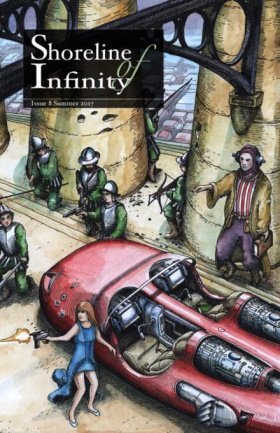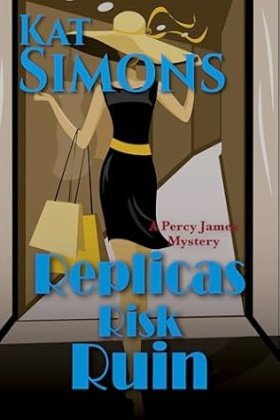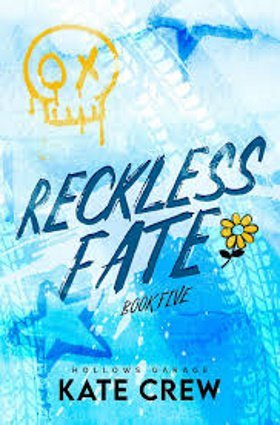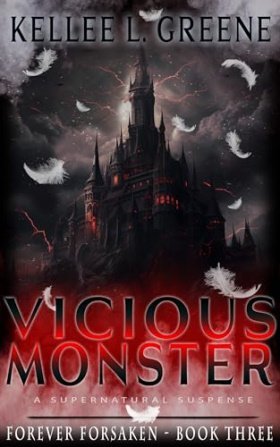Rupert Wong and the Ends of the Earth is the second part of the saga of Rupert Wong, our favorite cannibal chef. While Ends of the Earth is technically a novella, it packs more in its pages than most mammoth tomes we find on the shelves. The tremendous difficulty with novellas for writers is the fact that there are a lot more darlings that have to be killed in order to get the desired word count. Khaw’s blade, like the one belonging to her protagonist, is sharp and bloodied. There is nothing in this powerful punch of a story that shouldn’t be there and, surprisingly, I was not left holding the frayed strings of a dozen loose ends.
Ends of the Earth picks up after the end of the first novella in the series, Rupert Wong Cannibal Chef. If you haven’t read the first part, don’t worry, Khaw seamlessly weaves in just enough backstory at just the right moments to give an understanding without dragging the story down.
We follow Rupert from a bloody Beat Bobby Flay / Iron Chef competition where the main ingredients are sautéed eyeballs and browned entrails. Upon completing the contest, Rupert finds himself on the run, driven from where he lives to London where, against both his will and better judgement, he is press-ganged into the Greek pantheon. And, while guts and gore may be his specialty when he’s serving them, there’s a hint of compassion when he realises not all delicacies start as willing sources of food. But this humane revelation doesn’t come without a price. Gods are at war and Rupert must quickly find out if he’s 100% smart-ass or if he has some courage buried in his spinal cord.
Khaw hooked me from the beginning with her writing and I feel compelled to inject a paragraph of her descriptive power because it is just that good:
Orpheus is a literal head on the seat of his wheelchair, the stump of his throat putrid, purple-blotched. A tangle of nerves worm from beneath the flaps of his skin, knotting in the wheels, crawling over the armrests. I suspect that’s how he moves around but I’m not going to ask because frankly, I think I’ve hit my daily foot-in-mouth quota.
Khaw covers the better side of the Greek Pantheon in her story and expands on a world she introduced in the first Rupert Wong novella. Some of the gods and goddesses I remembered from history class, but not knowing all of them didn’t detract from the story at all. The characters are written in such a way that everyone belongs and nothing is out of place or feels forced in order to crowbar in a particular deity’s name.
As I said before: there is nothing in this story that shouldn’t be here and I strongly recommend picking it up to bring some color to the morning or afternoon commute. Of course, as with all cannibal cook-offs, that color’s going to be red.
 Ancestral Machines, A Humanity’s Fire Novel
Ancestral Machines, A Humanity’s Fire Novel
Michael Cobley
Orbit, 504 pages
Review: Duncan Lunan
I enjoyed the Humanity’s Fire trilogy which preceded this novel, but I was concerned that the opening of the Well into vast sub-layers of alternative realities and ancient technologies would submerge the emphasis on human values which had characterised the early parts of the trilogy. When I found that Ancestral Machines begins down there, I feared that my misgivings would be justified – intriguing though it was to find events in “a cavernous opening half a million miles wide and about three million long, its floor a vast plain littered with the cracked, smashed and split ruins of entire worlds”, like Slartibardfast’s workshop in the film version of Hitchhiker... if the antigravity failed. I was also put off by starting with a conversation between two artificial intelligences, of which I have been reading rather a lot in recent SF. However, the action moves from there up to our level of reality, the prime continuum, and though the drone which is dispatched to it has a major part to play towards the end, it’s out of action for much of the novel.
It’s sent to counter the emergence near ‘Earthsphere’ of a truly nasty construct called the Warcage, which was once an artificial solar system called the Great Harbour of Benevolent Harmony. It has long since been taken over by dissidents with a lust for war and conquest, who pit the inhabitants of its planets against one another, breeding ever more savage warriors, and replacing each world as it becomes ruined with a fresh one stolen from elsewhere. Such planet-collecting has featured in SF before, in the BBC’s long-forgotten serial The Big Pull, in a story by the late Lesley Hatch called ‘Asset-strippers’ in the Daily Record’s ‘Lance McLane strip’, and in Doctor Who. Until recently the general view in astrodynamics was that such collections of habitable worlds were dynamically impossible, and it’s described here as “a massive macro-engineering achievement”, although the late Prof. Archie Roy wasn’t so sure – simulations at Glasgow University had suggested that up to 60 earthlike worlds could be added to the inner Solar System without drastic effect. The recent discovery of seven earthlike planets tightly clustered around the star TRAPPIST-1 suggests that maybe planetary collection could work without super-technology to hold the system together. In that literal sense, the late Chris Boyce may not have been right when he said, “Interstellar chequers is not a viable mode of existence”.
The TV/film comparisons are appropriate because in his Acknowledgements Michael Cobley makes a second dedication, to the writers and actors of Firefly. Here the freelance starship captain is called Pyke (try not to think of the Star Trek pilot episode or of Dad’s Army, and when he meets up with a woman officer of Earthspace intelligence called Sam, try not to think of Stargate). We meet him when he’s just been robbed of a cargo and two of his crew have (apparently) been killed. Setting off in pursuit, he rescues another, stranded crew who take over the ship. To regain it and crew members being held hostage, he must penetrate the Warcage and assassinate a local overlord, to give rebellion against them time to find its feet.
That’s only a partial summary and there are numerous complicating elements, particularly a military leader on the other side who’s haunted by the personalities of his ancestors – at first an irritation but later to prove crucial. It’s all good rollicking stuff, and the few reservations I have concern characterisation and plot. I think Michael relies too much on reader knowledge of Firefly to let us link to his characters. The series is not that well known – it was just a word to me until Serenity was televised, amd not having the background, it meant little to me then. I wouldn’t have seen it now, but that my wife is a fan of Nathan Fillion in Castle. And while I can see him as ‘Mal’ Reynolds haring off after his missing cargo and revenge, for dramatic reasons within an episode, it’s at least possible (especially at movie length) that he would cut his losses, bide his time, and position himself for a more satisfying retribution. Like the one in Tom Toner’s The Promise of the Child, which I reviewed here in Issue No. 2, the whole assassination plot rests on similar shaky assumptions throughout. In particular, I can’t see Reynolds letting Firefly be taken over by strangers with such laughable ease: all it takes is for the last two crew members aboard Pyke’s ship to be given a false message that they’re wanted at the base of the ramp.
Starting a story in medias res is a powerful device, but it’s not always effective. Pyke loses two of his crew at the outset, more are taken hostage as he loses his ship, and on his way into the Warcage still another has to be left behind at a location which proves crucial later. I regret to say that I began to find this funny rather than sharing Pyke’s anger and grief, let alone the feelings of the other crew members, and when they’re reunited at the end I didn’t rejoice as I should, because I’d never seen them working together as a team in the first place. But now they are all back together and have their ship back, no doubt there will be more fun to come.
 The List
The List
Patricia Forde
Sourcebooks Jabberwocky, 368 pages
Review: Katie Gray
In the city of Ark, food, water and words are tightly rationed. The world as we know it has ended, the sea levels have risen, and in the last known bastion of civilisation the people must speak the new language, List, or be expelled into the forest. Care of the List, some five hundred words and falling, is in the hands of the city wordsmith, Benjamin, and his apprentice Letta.
One day Benjamin sets out into the wilderness on a routine word-finding expedition – and never returns. Left alone, Letta takes in an injured boy, Marlo, who she soon realises is one of the Desecrators, a mysterious band of terrorists who seek to take down Ark and List. And of course, through Marlo Letta begins the process of unlearning the truths she’s been taught her whole life.
Billed as Fahrenheit 451 meets The Giver, The List (first published as The Wordsmith in 2015) doesn’t quite live up to that pedigree, but it’s an enjoyable read with a strong, simple message: language is vital, art is vital, and their destruction is the destruction of humanity itself. There’s something to be said for this clarity of moral purpose, especially in the current political climate – sadly, The List’s central anti-authoritarian, anti-propaganda themes resonate more strongly now that on its initial publication.
The city of Ark and the daily lives of its residents are sketched very well, its infrastructure and logistics, and in particular the work of the wordsmiths. They collect and compile words, recording them in a card catalogue for preservation. Special lists are produced for people in technical professions; ‘pumped’ is reserved for those who work with water. When a citizen of Ark grows old, they sometimes ‘donate’ their words to the wordsmith. Speaking non-List words is illegal: fifteen infractions and you’ll be exiled.
Unfortunately, the wider world of The List is less convincing. There’s just enough information given about the history of Ark to make it implausible. A little less, and one could accept this new status quo at face value, but as it is I struggled to believe that anyone would really go along with List. Ark’s founder, John Noa, believed that language was the root of humanity’s evil. This is, to put it bluntly, patently bonkers. Do the people of Ark really believe him? Are they playing along out of fear? Some combination of the two? It’s never properly explained, and Letta’s faith in Noa, so central to the novel, isn’t fully convincing.
There are also hints throughout the novel of a romance brewing between Letta and Marlo, which I found somewhat unnecessary. They have little in the way of genuine, person-to-person interaction, and I didn’t feel much chemistry. If the romance was intended, it isn’t convincing, and it feels – as is too often the case – that as male and female leads of course they must be paired up. Also, must we really be reminded every time he appears that Marlo smells like sage?
Those issues aside, The List is an enjoyable novel with an intriguing premise, a solid moral message, and some great world-building. I don’t know if Patricia Forde has plans for a sequel, but I would absolutely read one – it would be great to see this world and its characters developed further.
 Stranger of Tempest
Stranger of Tempest
Tom Lloyd
Gollancz, 472 pages
Review: Ian Hunter
With ringing endorsements from the likes of Adrian Tchaikovsky, James Barclay and Edward Cox, and a great cover by Jon McCoy, of a lone rifleman (actually our hero armed with a Mage Gun that fires elemental bullets) about to square off to something that looks more than slightly like the Balrog from Lord of the Rings, you know you are going to be in safe hands with the first instalment of Lloyd’s The God Fragments entitled Stranger of Tempest.
We are dropped straight into the action as we join Lynx, a mercenary and his merry band who are about to rescue of a damsel in distress. Unfortunately, despite being naked and in some peril, this is no damsel and she’s more likely to cause distress to others. This is just the last thing that world-weary Lynx needs, although he could have probably picked less colourful mercenaries to join up with in the first place. This lot are led by Atanin, the Prince of Sun, and resemble a biker gang, some of whom get to wear a jacket depicting a card from a pokerish sort of card game. This results in gang members with names like Prince of Sun, Knight of Blood and Stranger of Tempest. Before we get to the aforementioned rescue of the damsel we helpfully get a table showing the mercenary deck of cards ranging from Sun, Stars, Blood, Snow and Tempest, and the face cards made up of Prince, Knight, Diviner, Stranger, Madman and Jester. In the gang Lynx has joined, some of these positions are empty, and unnamed. Whether or not any of them get filled will depend on how long the group can stay alive. They have rescued a female night mage who was held captive and are on the run from her captors – a bunch of religious fanatics called the Knights Charnel. The only way they can escape alive will be to travel through some abandoned tunnels – abandoned, for good reason.
Given that Lloyd has written eight previous novels, he is an old hand at world building. His creation is multilayered with its own rules and hierarchy and magical systems. There is the usual smattering of religious and political intrigue and since this is the first in a series we are on a need to know basis with reveals happening throughout the novel. We are given only tantalising mentions of the God Fragments and glimpses of creatures like the Elementals. Like some of the best books of this kind, Lloyd treats us to action, humour and lively banter between the mercenaries. Lynx has a few secrets of his own up his sleeve, or in what is left of his heart.
The God Fragments ends with some promo details about other Lloyd novels and an extract from his e-book only novella called Honour Under Moonlight! which takes place just a few weeks after Stranger of Tempest finishes and before the next novel Princess of Blood appears this summer. While Stranger of Tempest could be read as a stand alone novel, I suspect many readers will be dipping into that e-novella and joining that Princess in a few months time. I might too.

We don’t have room in the magazine to publish all our reviews—visit the website
www.shorelineofinfinity.com/reviews/
to read more.

 Multiverse
Multiverse
Russell Jones
Praise the merciful overlords; we’ve been given more space for SF poetry! To celebrate their benevolence, I present the work of (not two, but) three poets. As our tentacled masters demand, here are a few words to guide your ship in to dock…
“Extraterrestrial” by Lauren Harwyn follows a vicious life-form as it eats up star systems, feeding on pain. A relationship gone very sour indeed! Harwyn’s “When Bride Came” recounts the life of a traveller, god-like in the eyes of the sick and needy, building a world she doesn’t want to abandon.
Louise Peterkin’s “Pulses” blends gardening with natal alien growths to produce a verse of half-nightmare, half-serenity. Then, “My Father’s Sci-Fi”, a prose poem, reminisces about the great and good of SF, which slowly dissolves into something more sinister. Be careful, folks, SF can have harmful side-effects!
“Spring Offensive” by Colin McGuire considers the alienating effects of the changing seasons and years, electrified by airs of violence, rebellion and nihilism. Finally, McGuire’s “Juno” follows the NASA spacecraft on its flight to Jupiter, as if attending a wedding. But what does the future hold for a commitment spanning 1.74 billion miles?
Extraterrestrial
I’m too keen for this world.
I devour,
lapping up star systems























